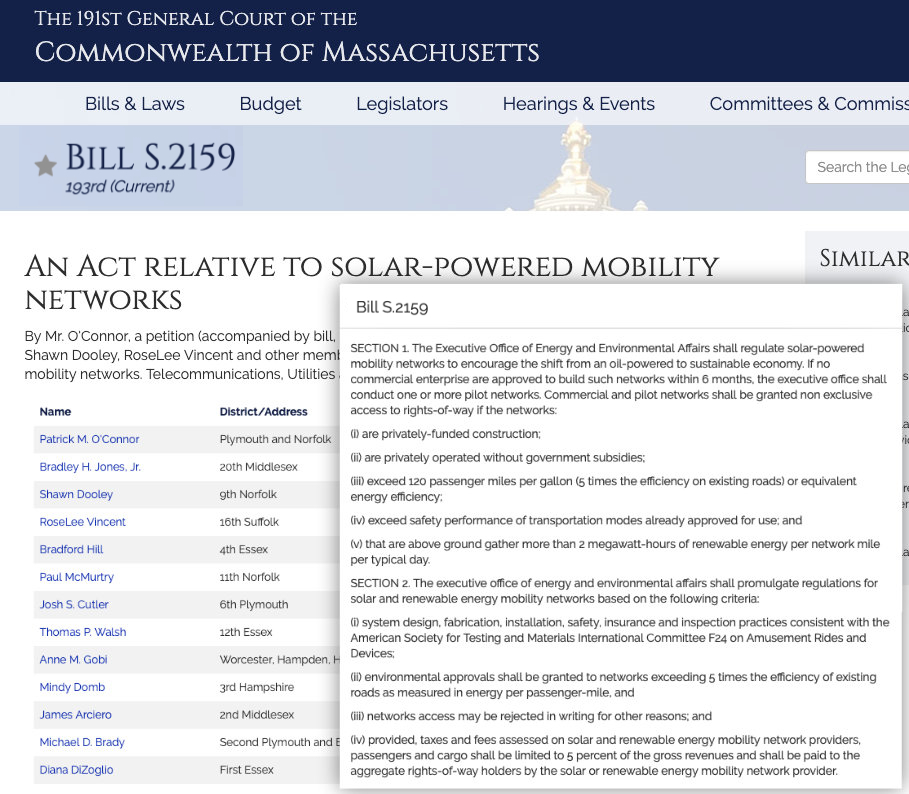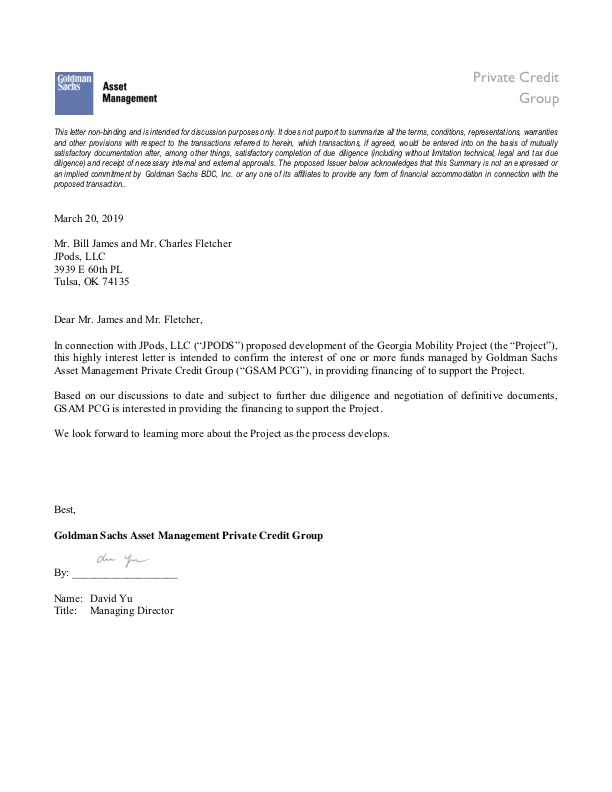At 4 AM on Jan 6, 2021, the Massachusetts Legislature passed the Transportation Bond Bill (H5248, unanimously by the House and one dissenting vote in the Senate). The Governor signed the portion with solar-powered mobility networks on Jan 15th. This breaks the regulatory barrier documented in Congressional study PB-244854. In the next few months we expect the 5X5 Standard will be institutionalized in at least one Massachusetts project:
- Page 21 and lines 717-720:
- provided further, that not less than $1,300,000 shall be expended for the executive office of energy and environmental affairs, in conjunction with the Massachusetts Department of Transportation, to develop and implement solar-powered mobility networks;

Click on the S.2159 image to go to the State web site to read the bill.
Repeat the success of communications in power and transportation by enforcing Constitutions and restoring liberty to innovate in standards-based free markets.
//////////// BEGIN: Solar Mobility Act/Ordinance ////////////
WHEREAS,
- Mobility is physical liberty, requiring mobility to be sustainable and equitable; and,
- The Boston Tea Party, a demonstration against a transportation monopoly resulted in John Adams writing Article 6 of the Massachusetts Constitution to forbid monopolies: “No man, nor corporation, or association of men, have any other title to obtain advantages, or particular and exclusive privileges.;”
THEREFORE, BE IT RESOLVED, To encourage economic development, transportation innovation in a free market, and personal liberty, the State of Massachusetts shall regulate grade-separated networks of self-driving vehicles by the following 5X5 Standard:
- Network construction must be privately funded.
- Networks must exceed 5 times the efficiency on existing roads (125 mpg or equivalent energy efficiency).[[metrics replacing political decisions]]
- Networks meeting the 5X efficiency standard are automatically approved unless rejected in writing, for any reason whatsoever, within 30 days of plan submission. [[remove bureaucratic delays and allow governments to enforce public interests]]
- Networks pay 5 percent of the gross transportation revenues to the aggregate rights-of-way holders.[[compensate the taxpayers for Rights of Way use]]
- Networks operate without government subsidies. [[place risk on innovators, not taxpayers]]
- Rights of Way access shall be granted based on existing regulations of the Massachusetts Department of Transportation, county, and city governments. [[existing policies for telecommunications and energy]]
- Networks must exceed the safety performance of transportation modes already approved for use.
- To make cities as safe as theme parks, grade-separated guideways must be designed, fabricated, installed, insured, and inspected in compliance with the ASTM International F24 standards for Amusement Rides and Devices, Massachusetts Department of Public Safety policies. [[Known cost of regulations is essential for capital investment. This is the Disney monorail standard, existing regulations, existing enforcement, existing common law, existing safety record 10,000 times better than roads (0.9 injuries per million versus 11,200 injuries per million on roads]]
- Gather more than 2 megawatt-hours of renewable energy per network mile per typical day.[[sustainable energy supply. JPods
//////////// END: Solar Mobility Act/Ordinance ////////////
4-minute version explaining without the background on why regulations are important.
Rule of Law
- The Constitution is the primary Rule of Law in America.
- The Constitution Divided Sovereignty in the Preamble, as restated in Amendments 9 and 10:
- People retain all liberties not enumerated as sacrificed in written Constitutions.
- The federal government has unlimited taxing powers for the limited sovereignty of waging war and suppressing behaviors that build paths to war.
- The state governments are sovereign over issues of crimes, civil disputes, and other areas specifically enumerated in their constitutions.

Background:
Boston Tea Party resulted in the “post Roads” restriction in the Constitution. It forbids the mixing of Federal taxing for war-powers with taxing for commercial interests, “internal improvements.”
Federalist #45, Madison: “The powers delegated by the proposed Constitution to the federal government are few and defined. Those which are to remain in the State governments are numerous and indefinite. The former will be exercised principally on external objects, as war, peace, negotiation, and foreign commerce; with which last the power of taxation will, for the most part, be connected. The powers reserved to the several States will extend to all the objects which, in the ordinary course of affairs, concern the lives, liberties, and properties of the people, and the internal order, improvement, and prosperity of the State.”
- Since the 16th, 17th, and 18th Amendments and The Federal-Aid Highway Act of 1916, politicians mixed war-making with their commercial interests resulting in Civilization Killers of:
- Resource depletion – US Peak Oil was in 1970. Life requires energy. Less affordable oil, less life (Energy Economics).
- Eight Presidents issuing unanswered calls to action to end foreign oil addiction. The week of May 17, 2919, the Federal government:
- Mortgaged Posterity at $432 million/day.
- To import 7.2 million barrels the week.
- There is a great deal of misinformation in the US today about being “energy independent.”
- $22 trillion in Federal debt, rising in tandem with oil imports.
- Perpetual oil-wars since 1991.
- Terrorist attacks funded by oil-dollars.
- Climate Change
- $1.7 trillion/year in traffic costs.
- Enforcing the Constitution provides the path to creating millions of jobs converting traffic costs into value and preempting Civilization Killers. Restoring the Rule of Law in transportation today will repeat the benefits of restoring the Rule of Law in communications in 1982:
Federalist #62, Madison: “What prudent merchant will hazard his fortunes in any new branch of commerce when he knows not but that his plans may be rendered unlawful before they can be executed? What farmer or manufacturer will lay himself out for the encouragement given to any particular cultivation or establishment, when he can have no assurance that his preparatory labors and advances will not render him a victim to an inconstant government? In a word, no great improvement or laudable enterprise can go forward which requires the auspices of a steady system of national policy.”